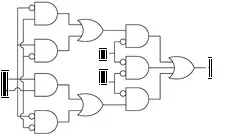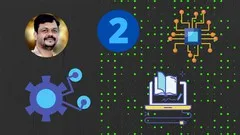
Digital Design of Logic Circuits 
Learn the art of Digital Design of Logic Circuits in this comprehensive course. No specific background is required, as you will be guided through everything you need to know. Master number systems and Boolean algebra, as they form the foundation for the rest of the course. Discover the importance of simplifying Boolean functions using Karnaugh maps and logic gates for optimized circuit design. Don't waste money and energy on non-optimized designs! Dive into the design of combinational and synchronous circuits, as well as specific logic devices like registers, counters, and memory units. Unleash your creativity with solid mathematical design knowledge. ▼
ADVERTISEMENT
Course Feature
![]() Cost:
Cost:
Paid
![]() Provider:
Provider:
Udemy
![]() Certificate:
Certificate:
Paid Certification
![]() Language:
Language:
English
![]() Start Date:
Start Date:
2022-08-15
Course Overview
❗The content presented here is sourced directly from Udemy platform. For comprehensive course details, including enrollment information, simply click on the 'Go to class' link on our website.
Updated in [September 27th, 2023]
What does this course tell?
(Please note that the following overview content is from the original platform)In this course we teach logic circuit design There is no specific background required for this course You will learn everything you need to master on the courseIn this course first number systems and Boolean algebra are explained The student of this course should learn number systems especially binary numbers and Boolean algebra very well since the rest of the subjects lie on these two topicsWe introduce Boolean functions and explain the simplification of Boolean functions using Karnaugh maps and introduce logic gates Simplification of the Boolean functions is an important concept for the optimized design of logic circuits Dont forget that every extra gate you use in your non-optimized design means a waste of money and extra energy use and low-speed functioning For these reasons optimizing your design is as important as performing a design The design of combinational circuits is covered in the course Following the combinational circuit design topic we explain the design of clocked or synchronous circuits Then the design of specific logic devices such as registers counters and memory units are explained The student of this course should try to get the design philosophy taught in this course Students usually are interested in the functioning of the circuits and try to avoid to master on mathematical design concepts however without good mathematical design knowledge one cannot do creative designs
We considered the value of this course from many aspects, and finally summarized it for you from two aspects: skills and knowledge, and the people who benefit from it:
(Please note that our content is optimized through artificial intelligence tools and carefully reviewed by our editorial staff.)
What skills and knowledge will you acquire during this course?
During this course on Digital Design of Logic Circuits, students will acquire the following skills and knowledge:
1. Understanding of number systems: Students will learn about different number systems, with a focus on binary numbers. This knowledge is essential for working with logic circuits.
2. Proficiency in Boolean algebra: Students will gain a strong understanding of Boolean algebra, which is crucial for designing and simplifying Boolean functions.
3. Simplification of Boolean functions: Students will learn how to simplify Boolean functions using Karnaugh maps. This skill is important for optimizing the design of logic circuits, as it helps reduce the number of gates used.
4. Introduction to logic gates: Students will be introduced to different logic gates and their functions. This knowledge is fundamental for designing logic circuits.
5. Design of combinational circuits: The course covers the design of combinational circuits, which are circuits that produce an output based on the current input only.
6. Design of clocked or synchronous circuits: Students will learn how to design clocked or synchronous circuits, which are circuits that operate based on a clock signal.
7. Design of specific logic devices: The course will explain the design of specific logic devices such as registers, counters, and memory units. These devices are commonly used in digital systems.
8. Emphasis on design philosophy: The course will teach students the importance of design philosophy in creating efficient and optimized logic circuits. Students will be encouraged to think creatively and consider factors such as cost, energy efficiency, and speed.
9. Mathematical design concepts: The course emphasizes the importance of mathematical design knowledge. Students will learn that a strong understanding of mathematical concepts is necessary for creating innovative and effective designs.
Who will benefit from this course?
This course on Digital Design of Logic Circuits will benefit individuals interested in or pursuing careers in the field of electrical engineering, computer engineering, or computer science.
Specific professions that will benefit from this course include:
1. Electrical Engineers: This course will provide electrical engineers with the necessary knowledge and skills to design and optimize logic circuits. They will learn about number systems, Boolean algebra, and the simplification of Boolean functions, which are essential for designing efficient and cost-effective circuits.
2. Computer Engineers: Computer engineers will find this course valuable as it covers the design of combinational circuits, clocked or synchronous circuits, and specific logic devices such as registers, counters, and memory units. These concepts are fundamental to computer architecture and digital system design.
3. Computer Scientists: This course will enhance the understanding of computer scientists in the area of digital logic design. They will gain insights into the functioning of circuits and the design philosophy behind them. This knowledge is crucial for developing efficient algorithms and optimizing system performance.
4. Students interested in hardware design: Individuals aspiring to work in the field of hardware design, such as integrated circuit designers or FPGA engineers, will greatly benefit from this course. It provides a solid foundation in logic circuit design principles and techniques, which are essential for creating complex digital systems.
Course Syllabus
Multiplexers
Course Provider

Provider Udemy's Stats at AZClass
Discussion and Reviews
0.0 (Based on 0 reviews)
Explore Similar Online Courses

AMERICAN ENGLISH PRONUNCIATION: Accent Reduction Made Easy

Building Big Data Pipelines with SparkR & PowerBI & MongoDB

Python for Informatics: Exploring Information

Social Network Analysis

Introduction to Systematic Review and Meta-Analysis

The Analytics Edge

DCO042 - Python For Informatics

Causal Diagrams: Draw Your Assumptions Before Your Conclusions

Whole genome sequencing of bacterial genomes - tools and applications

The Ultimate : Digital System Design ( Module - 1)

CMOS Digital Integrated Circuit Design


Start your review of Digital Design of Logic Circuits